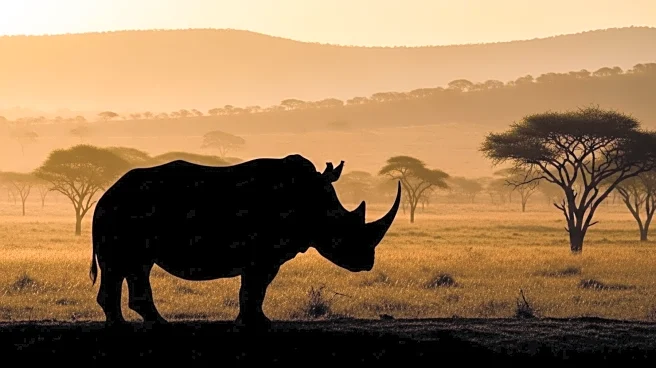What is the story about?
What's Happening?
A recent report by TRAFFIC and the International Union for Conservation of Nature (IUCN) highlights the precarious situation of rhinoceros populations worldwide. Poaching, drought, and habitat fragmentation have severely impacted rhino numbers, with white rhinos in southern Africa at their lowest in two decades and Javan rhinos numbering fewer than fifty. Despite these challenges, there are positive developments, such as the rebound of greater one-horned rhinos in India and Nepal to over 4,000 individuals and a slight increase in black rhino numbers. Conservation efforts, including habitat restoration and dehorning, have significantly reduced poaching in some regions. Technological advancements, like the first successful IVF pregnancy in a rhino, offer hope for future recovery.
Why It's Important?
The survival of rhinoceros species is crucial for maintaining biodiversity and ecological balance in their native habitats. The report underscores the importance of continued conservation efforts and international cooperation to combat poaching and habitat loss. The use of technology in conservation, such as IVF, represents a promising tool for preserving endangered species. However, the illegal trade in rhino horns remains a significant threat, driven by high demand in East Asia. The report calls for increased vigilance, political will, and community involvement to ensure the long-term survival of rhinos, highlighting the broader implications for global wildlife conservation.
What's Next?
Conservationists are likely to intensify efforts to protect rhino populations through enhanced anti-poaching measures and habitat restoration projects. The success of technological interventions, such as IVF, may lead to further research and application in other endangered species. International collaboration and policy-making will be crucial in addressing the illegal wildlife trade and ensuring sustainable conservation practices. As World Rhino Day is observed, stakeholders may use the occasion to raise awareness and mobilize support for rhino conservation initiatives.
Beyond the Headlines
The plight of rhinoceros populations highlights broader issues of wildlife conservation, including the impact of climate change and human activities on biodiversity. The report emphasizes the need for ethical considerations in conservation strategies, balancing technological interventions with natural preservation. The cultural significance of rhinos in their native regions also plays a role in conservation efforts, as communities take pride in living alongside these iconic animals. Long-term success will depend on integrating scientific advancements with traditional conservation methods and fostering global cooperation.
















